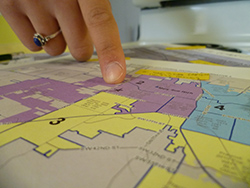On the campaign trail: Ocala, Florida
Candidates are urging city residents to exercise their democracy, but will the city take action to prevent prison-based gerrymandering?
by Leah Sakala, October 23, 2012

The Florida city of Ocala got some national attention last week when vice presidential candidate Paul Ryan made a campaign stop in the downtown square on Thursday. But the question of who to vote for on November 6th isn’t the only democracy issue that Ocala residents are currently facing. As I write, the city is working on upholding the “one person, one vote” principle by redrawing the four city council districts to equally distribute the city’s population among them.
But Ocala’s redistricting process is plagued by one major flaw: the city is relying on census data that includes the 1,674 people in the Marion County Jail.
Because the city did not adjust the census data to ignore the jail count, both of the plans that are currently under consideration have lines that are skewed by the jail population.
Fortunately, the city of Ocala has not yet completed the redistricting process, so there’s still time to save local democracy from being skewed by the Census Bureau’s correctional counts. The solution is simple: remove the incarcerated population from the census data used to draw the new districts. If Ocala chooses to implement this solution, it will be in good company; more than 175 other local governments around the country chose to adjust the Census Bureau’s data to avoid prison-based gerrymandering.
How Ocala chooses to deal with this problem is an especially big concern for city residents. But all across the nation, cities and counties that contain correctional facilities face the same problem of how to deal with census data that does not accurately reflect actual communities. So, as we comb over ballot initiative proposals and peruse candidates’ positions this election season, it behooves us to take a step back and consider how the consequences of the Census Bureau’s correctional facility count may be undermining our democratic rights and responsibilities.



